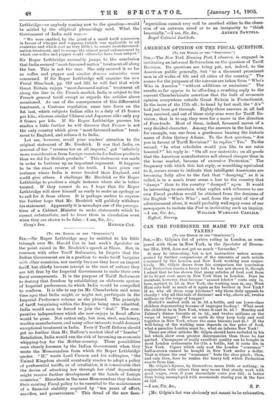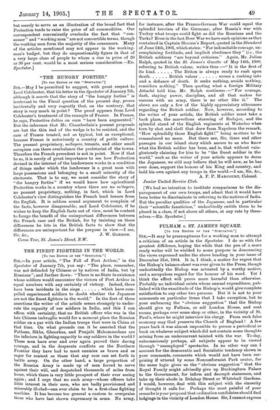[To THE EDITOR OP THE " SPECTATOR.") Gilnin's list of
prices ruling in London, as com- pared with those in New York, in the Spectator of Decem- ber 31st, 1904, does not get us much "forrarder."
It may be interesting, but is not instructive unless accom- panied by further comparisons of the amounts of each article consumed by the London and New York working man respec- tively. Mr. Gilpin draws from his comparison the conclusion that Protection exacts a heavy toll; he has not shown it, though I admit that he has shown that many articles of food cost from 20 to 30 per cent. more in New York than in London. Does he maintain, however, that because "canned lobster" costs only Is. here, against ls. 7d. in New York, the working man in, say, West Ham eats half as much of it again as his brother in New York? If so, why all these soup kitchens? why these daily appeals to charity ? why all this talk of distress ? and why, above all, twelve millions ou the verge of hunger?
Horlick's malted milk at 2s. 5d. a bottle, and our lower-class children degenerating because of improper feeding ! What must the children be in New York, where it cost 3s. 4d. ? Huntley and Palmer's dinner biscuits at Is. 5d., and twelve millions on the verge of hunger ! How on earth do they keep body and soul together in New York, where the same biscuits cost 2s. ? If the well-being of the working man depends on the price of food, what a paradise London must be ; what an inferno New York !
There are other articles Mr. Gilpin should. have included in his list which show even greater discrepancies than those he has quoted. Champagne of really excellent quality can be bought in most London restaurants for I15s. a bottle, but it costs 30s. in New York. Cigars which only cost the London " consumer " half-a-crown cannot be bought in New York under a dollar. That is where the real "consumer" feels the shoe pinch ; then, and only then, does he realise the heavy toll which Protection exacts from him.
Mr. Gilpin's figures, by themselves, mean little or nothing; in conjunction with others they may mean that steady work with good wages, even if your marmalade costs you 10d., is better than being unemployed with marmalade staring you in the face at 5id.
am, Sir, &c, S. F.
[Mr. Gilpin's list was obviously not meant to be exhaustive, but merely to serve as an illustration of the broad fact that Protection tends to raise the price of all commodities. Our correspondent conveniently overlooks the fact that "con- sumer" and " working man" are not convertible terms, though the working men form the majority of the consumers. Many of the articles mentioned may not appear in the working- man's budget, but they do unquestionably figure in that of a very large class of people to whom a rise in price of 20 or 30 per cent. would be a most serious consideration.—En. Spectator.] "THE HUNGRY FORTIES."







































 Previous page
Previous page